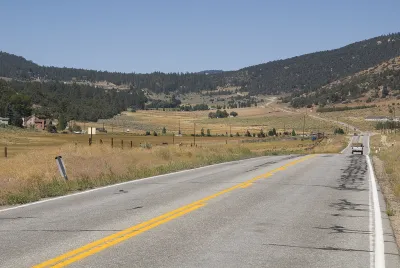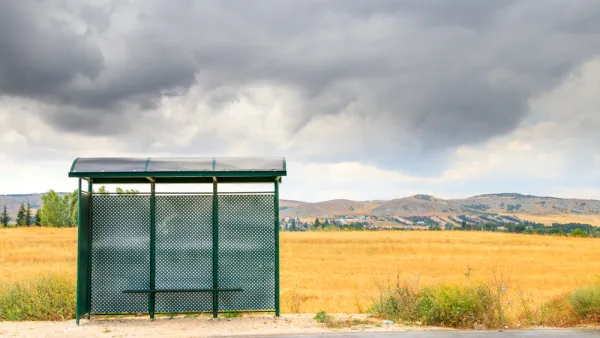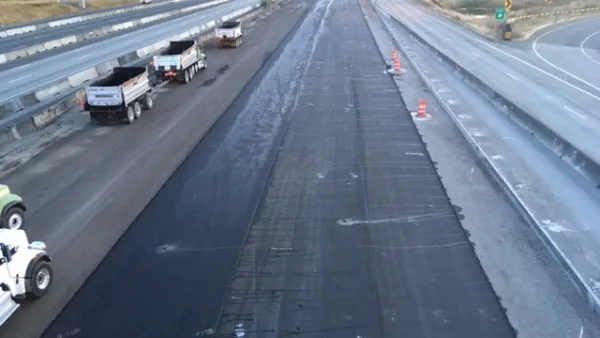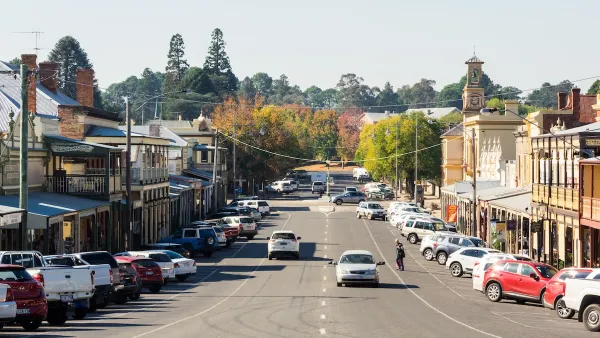Despite the reputation of rural America as "drive-through country," many residents depend on walking and transit to get around.

A new report argues for the urgent need for sustainable public transportation options in rural communities. But, according to Kea Wilson, "the federal politicians who govern them are stonewalling the very legislation that could give it to them, like President Biden’s Build Back Better Act."
The study from Smart Growth America and Third Way found that rural commutes have risen by 15 minutes in 16 years, "thanks in part to increasing consolidation in large employers and the continued proliferation of car-centric transportation planning in their communities." Meanwhile, "[s]hopping trips are 14 percent longer, and the average social or recreational trip has swelled from just over 16 miles at the turn of the century to nearly 18 miles." This adds up to car trips that were 41 percent longer in 2017 than in 2001.
This phenomenon, the report's authors say, is "more avoidable than we might assume." Even in rural areas, it's possible for people to access everyday needs without a car. But many rural legislators oppose legislation that would create better public transit in their regions, viewing rural America as "drive-through country." The report points out that "in reality, the majority of U.S. counties in which 10 percent or more of the population are living without access to a car are rural." rural America, the authors say, has more density than urbanites imagine. "Making those dense centers actually accessible to people on foot, though, can be a challenge, particularly in communities where the town 'main street' is a highway."
The authors call for state leaders to prioritize pedestrian infrastructure and safety, while suggesting that the federal can pave the way for improved rural infrastructure by "revising outdated manuals used by transportation agencies to design streets, including in the Manual on Uniform Traffic Control Devices (MUTCD), and reframing them and removing standards and guidance that lead to streets that are hostile to or dangerous for those outside of a vehicle." The report also recommends a series of other reforms, including more robust data and investment in transit, which advocates hope the Build Back Better plan can deliver.
FULL STORY: Study: Rural Areas Need Safe, Sustainable Transportation Now

Analysis: Cybertruck Fatality Rate Far Exceeds That of Ford Pinto
The Tesla Cybertruck was recalled seven times last year.

National Parks Layoffs Will Cause Communities to Lose Billions
Thousands of essential park workers were laid off this week, just before the busy spring break season.

Retro-silient?: America’s First “Eco-burb,” The Woodlands Turns 50
A master-planned community north of Houston offers lessons on green infrastructure and resilient design, but falls short of its founder’s lofty affordability and walkability goals.

Test News Post 1
This is a summary

Analysis: Cybertruck Fatality Rate Far Exceeds That of Ford Pinto
The Tesla Cybertruck was recalled seven times last year.

Test News Headline 46
Test for the image on the front page.
Urban Design for Planners 1: Software Tools
This six-course series explores essential urban design concepts using open source software and equips planners with the tools they need to participate fully in the urban design process.
Planning for Universal Design
Learn the tools for implementing Universal Design in planning regulations.
EMC Planning Group, Inc.
Planetizen
Planetizen
Mpact (formerly Rail~Volution)
Great Falls Development Authority, Inc.
HUDs Office of Policy Development and Research
NYU Wagner Graduate School of Public Service




























